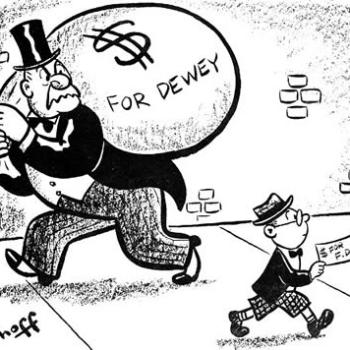History prof and never-dull blogger John Fea was talking up the Junto before the new group blog on early American history even launched in December.
Fea was right. The team of academics contributing to the Junto offer a consistently intriguing stream of smart commentary that, like all the best history, tells us as much about the present as it does about the past. It’s a great read even for those of us who aren’t historians and who sometimes can’t remember if it’s Philip Vickers Fithian or Philip Fickers Vithian.
For a taste of what the Junto has to offer, let me recommend two recent posts discussing two popular fantasy role-playing games that draw on the American Revolution.
“American Revolution: The Game,” a post by Michael D. Hattem, looks at Assassin’s Creed III. Hattem says the game designers did their homework and all that research pays off in a meticulous, thrilling game-world:
I found the gaming experience of walking around Boston (as an English gentleman) to be both personally thrilling and historically enlightening. The cities were designed from historical maps and are incredibly accurate renderings. But it’s not just the layouts that are accurate. Walking down the streets of Boston in 1754, one witnesses robberies (of which no one bothers to take notice), various groups of persons interacting, random dogs and pigs wandering the streets, small groups of children in ripped clothing and no shoes harassing passers-by, and groups of British soldiers marching through the streets who will just come up to you and push you around if you make yourself too conspicuous. It really brings to life the sort-of — for lack of a better term — Wild-West nature of colonial urban life.
… Both the settings and the storyline … are amazingly detailed and complex. … In the end, barring a time machine, this game is as close as one can get to a dynamic visual experience of colonial and revolutionary settings. For the non-historian, the game will also bring home the violent nature of the Revolution, something often downplayed in popular history and oft-ignored even in the scholarship. Being an early Americanist, the game has led me to consider more the nature of the settings in which the historical subjects about whom I write lived.
One of the highlights, Hattem says, is the sequence in the game in which players participate in the Boston Tea Party:
I found it quite exciting to walk into the Green Dragon Tavern to interact with Samuel Adams and to subsequently board the Dartmouth to take part in the Tea Party. At one point, your character has to ride his horse from Boston all the way out to Lexington on a snowy evening, the rendering of which was stunning.
It is exciting to imagine oneself as a participant in a courageous act of revolutionary change like the Tea Party. And that may explain much of the popularity of the other game recently discussed on the Junto — the movement that named itself after that very event.
The “tea party” is often treated mainly as a political movement, but that view quickly becomes untenable, since it requires us to try to make sense out of the movement’s political views and agenda. And from a strictly political perspective, that can’t be done. The movement begins to make more sense if, instead, we view it as a massive multiplayer live-action role-playing game.
Hattem doesn’t explicitly use that language, but that understanding informs his post on the movement, “The Founders, the Tea Party, and the Historical Wing of the ‘Conservative Entertainment Complex.'” Hattem says this game, unlike Assassin’s Creed III, isn’t much fun. And the game’s creators didn’t do their homework:
In recent years, men like David Barton, Bill O’Reilly, and Glenn Beck, among numerous others, have written a number of books on 18th-century figures and events. But though they claim to be getting their principles directly from “the founders,” what they are really doing is giving their principles to the founders and the 18th century, more generally. This revisionism, promoted by conservative think tanks, was lapped up by hardcore conservatives and perhaps no group of people has been a more receptive audience than those who identify themselves as supporters of the Tea Party.
A few years ago, Tea Partiers began appearing at public rallies dressed in inaccurate historical garb and carrying homemade signs, some of which took a decidedly 18th-century approach to spelling. The rank-and-file claimed (and believed themselves) to be independent of the GOP and sincerely called for a return to the Constitution and to our “founding principles.”
But, as the agenda of the right-wing intelligentsia and their interest groups insidiously took greater precedence, the Tea Party and the historical wing of the conservative entertainment complex were forced to twist the founders into ideological and historical pretzels until they appeared to be nothing less than spokesmen for the 21st-century GOP agenda, i.e., the founders as right-wing “fellow travelers.”
Through this revisionism, the founders have not only become honorary NRA members, they have also by turns become monolithically anti-tax, anti-government, pro-free market, pro-individualism, and deeply religious fundamentalist Christians.
Do read the whole thing. You’ll be glad you did.
I don’t play video games much, but Assassin’s Creed III sounds appealing to me for its storyline and meticulous world-building. I find that sort of thing a lot of fun. The tea-party LARP, though, doesn’t seem much fun at all. Resentment never is.
















